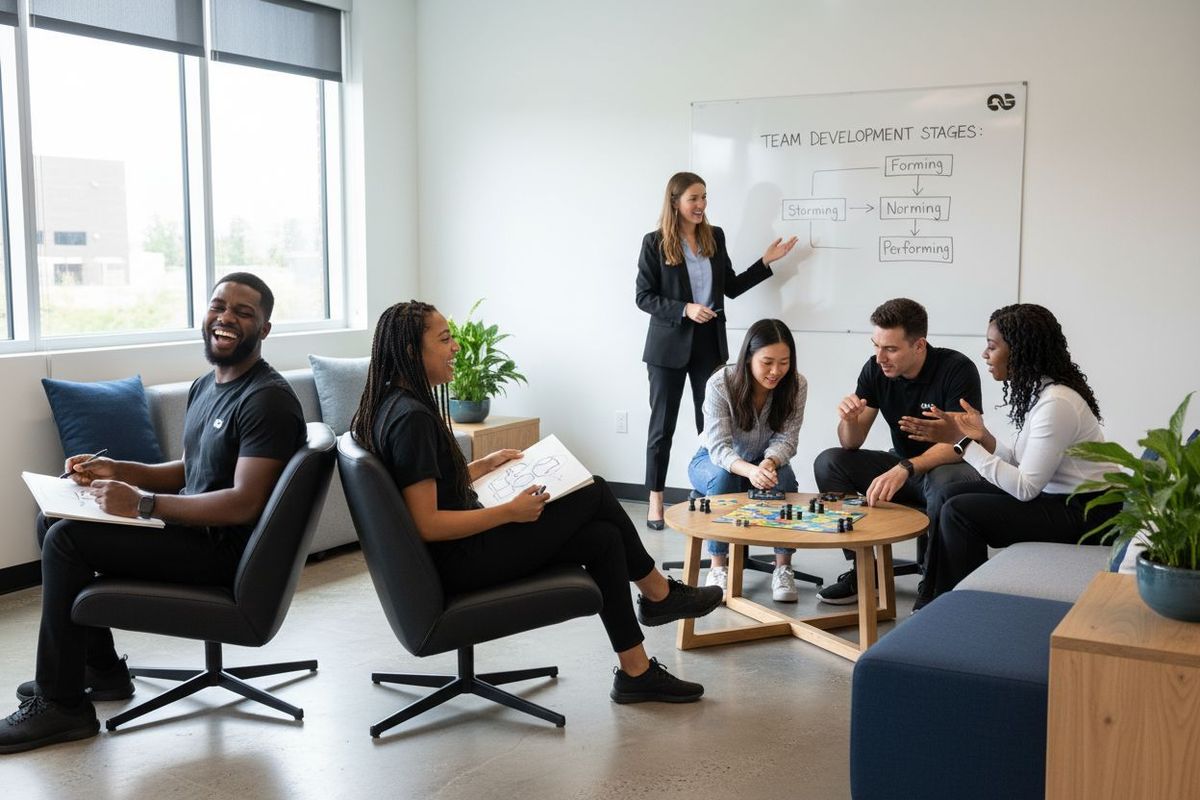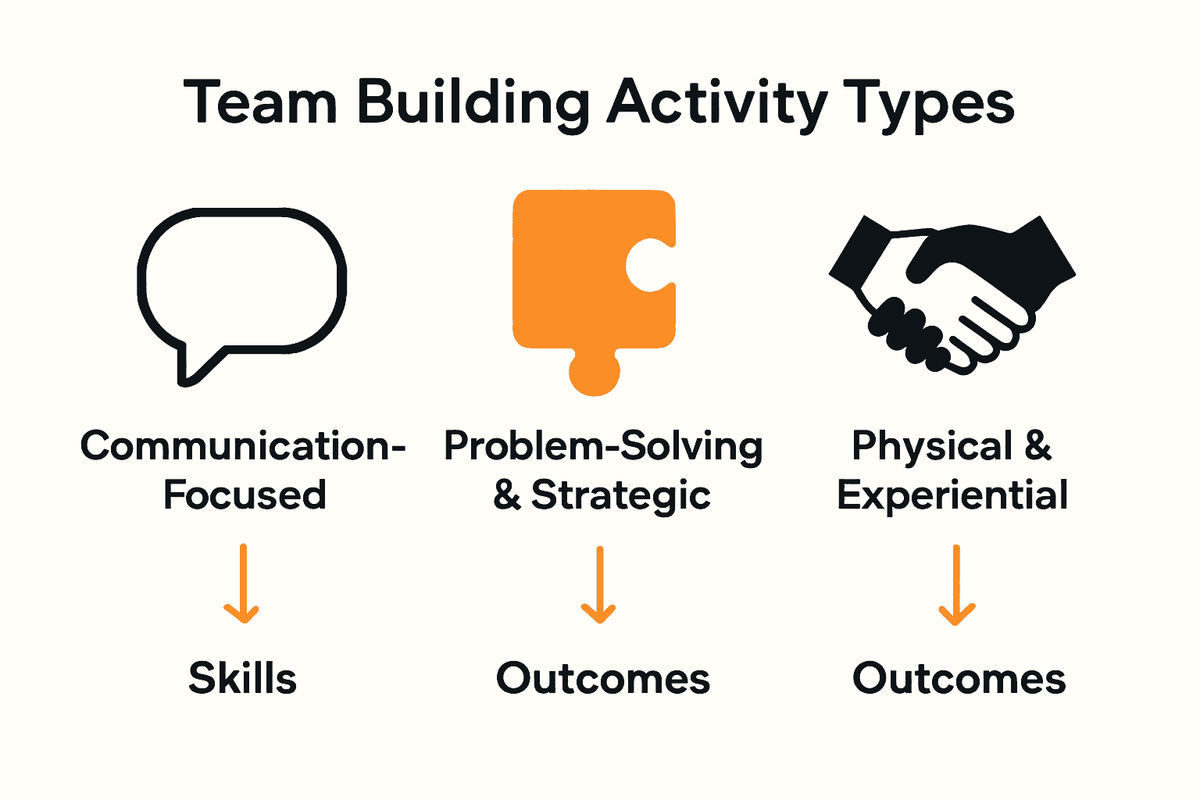Complete Guide to Team Building Concepts Explained
October 15, 2025

Did you know that teams with strong social connections can outperform technically proficient groups by over 30 percent? Most people believe team building is just about fun games, but research shows its true power lies in building trust, improving communication, and boosting collective results. When organizations foster teamwork intentionally, they unlock higher creativity, reduced stress, and more resilient problem-solving across departments.
Key Takeaways
| Point | Details |
|---|---|
| Meaning of Team Building | Effective team building transforms individuals into a cohesive unit through strategic interpersonal connections. |
| Intentionality Required | Successful teams do not form automatically; they require deliberate cultivation and ongoing effort from leadership. |
| Diverse Activity Formats | Effective team building involves a mix of communication, problem-solving, and physical activities to develop diverse skill sets. |
| Social Skills Matter | Strong social skills significantly enhance team dynamics and overall success, underscoring the importance of emotional intelligence in team settings. |
Table of Contents
- Defining Team Building And Common Myths
- Types Of Team Building Methods And Activities
- Key Elements Driving Team Effectiveness
- Benefits And Challenges In Corporate Settings
- Innovative Team Building With Interactive Games
Defining Team Building and Common Myths
At its core, team building is more than just a corporate buzzword - it's about creating meaningful connections that transform individual contributors into a cohesive, high-performing unit. Think of it like turning a group of talented musicians into a synchronized orchestra, where each person's unique skills harmonize to create something greater than their individual contributions.
Myth #1: Team Building is Just About Fun Activities Contrary to popular belief, effective team building goes far beyond random games or occasional social events. An intriguing study analyzing performance in Age of Empires II revealed something fascinating: certain individuals consistently improve team outcomes through their social skills, not just technical proficiency. According to research published in the computational sociology archives, teams with stronger interpersonal dynamics significantly outperform groups with only task-based competence.
Key Characteristics of Successful Team Building:
- Develops genuine interpersonal understanding
- Creates shared communication strategies
- Identifies and leverages individual strengths
- Builds psychological safety and trust
- Enhances collaborative problem-solving skills
Myth #2: Team Building Happens Automatically Effective teams don't emerge by chance. They require intentional cultivation, strategic interaction, and consistent effort. Just like any skill, teamwork is learned and refined through deliberate practice. Managers who understand this principle can create environments where collaboration flourishes naturally, transforming a collection of individuals into a powerful, unified team.
The most successful organizations recognize that team building is an ongoing process - not a one-time event. It's about creating a culture of mutual respect, open communication, and collective achievement.

Types of Team Building Methods and Activities
Team building activities come in diverse formats, each designed to unlock different aspects of team dynamics and interpersonal skills. Collaborative exercises are not just about having fun - they're strategic interventions that develop critical workplace competencies through engaging, interactive experiences.
Communication-Focused Activities
Some of the most effective team building methods focus specifically on communication skills. According to Surf Office research, creative exercises like 'Paper Telephone' brilliantly demonstrate how communication can become distorted through successive interpretations. In this game, participants pass a message through writing and drawing, revealing the complexities of information transmission.
Key Communication-Building Exercises:
- Back-to-Back Drawing
- Verbal Instruction Challenges
- Storytelling Relay Games
- Nonverbal Communication Workshops
- Complex Problem-Solving Scenarios
Problem-Solving and Strategic Thinking Activities
Another critical category of team building involves challenges that require collective intelligence and strategic thinking. These activities push teams to collaborate under simulated pressure, developing skills like:
- Rapid decision making
- Resource allocation
- Creative problem solving
- Collective strategic planning
- Conflict resolution
Physical and Experiential Team Building
Physical challenges and outdoor activities offer unique opportunities for team bonding. Whether it's navigating an obstacle course, participating in a charity event, or solving complex group challenges, these experiences create shared memories and build trust in ways traditional workplace interactions cannot.
The most effective team building approaches blend multiple activity types, recognizing that teams are complex ecosystems requiring nuanced, multifaceted development strategies.
Here's a comparison of major types of team building activities and their core benefits:

| Activity Type | Core Skills Developed | Typical Examples |
|---|---|---|
| Communication-Focused | Active listening Clear messaging Empathy | Back-to-Back Drawing Paper Telephone |
| Problem-Solving & Strategic | Group decision-making Critical thinking Conflict resolution | Escape Rooms Resource Allocation Games |
| Physical & Experiential | Trust building Camaraderie Resilience | Obstacle Courses Charity Events |
| Digital & Interactive Games | Virtual collaboration Agile thinking | NoviCraft The Go Game |
Key Elements Driving Team Effectiveness
Team performance is far more complex than simply assembling skilled individuals. It's about creating a sophisticated ecosystem where collective capabilities dramatically exceed individual potential. Understanding the underlying mechanics of high-performing teams requires deep insight into the nuanced interactions that transform groups into powerful collaborative units.
Social Skills and Team Familiarity
Research from computational sociology reveals fascinating insights about team dynamics. The study demonstrates that social skills are not just nice-to-have attributes, but critical drivers of team success. Individuals with strong interpersonal abilities can significantly enhance team performance, with their impact magnified when team members have prior shared experiences.
Critical Social Performance Factors:
- Emotional intelligence
- Active listening capabilities
- Adaptable communication styles
- Conflict resolution skills
- Empathetic understanding
Psychological Safety and Team Norms
According to research in software engineering teams, two fundamental elements profoundly impact team effectiveness: psychological safety and team norms. Interestingly, while both factors positively predict team performance, clear and well-established team norms emerge as a markedly stronger predictor of success and job satisfaction.
Key Characteristics of High-Performing Teams:
- Transparent communication channels
- Mutually understood behavioral expectations
- Safe environments for vulnerability and learning
- Consistent feedback mechanisms
- Shared accountability structures
The most successful teams don't just happen - they are intentionally cultivated through strategic design, continuous learning, and a commitment to understanding the delicate human dynamics that transform individual potential into collective excellence.
Benefits and Challenges in Corporate Settings
Team building represents a powerful organizational strategy, but like any sophisticated approach, it comes with nuanced advantages and potential pitfalls. Understanding these dynamics helps leaders design more effective and meaningful team development experiences.
Organizational Benefits
According to Team Building Hub research, corporate team building offers profound advantages that extend far beyond simple social interactions. Diverse teams experience enhanced creativity and innovation, while supportive peer relationships directly contribute to reduced workplace burnout and increased overall happiness.
Key Positive Outcomes:
- Increased employee motivation
- Enhanced interdepartmental communication
- Improved problem-solving capabilities
- Higher workplace satisfaction
- Reduced individual stress levels
Financial and Structural Challenges
Klar HR's comprehensive guide highlights critical challenges organizations must navigate. Corporate team building can involve substantial financial investments, and poorly structured activities risk creating more interpersonal tension than cohesion.
Potential Implementation Challenges:
- High monetary costs
- Risk of superficial engagement
- Potential for generating unintended conflicts
- Limited long-term impact without consistent reinforcement
- Difficulty measuring direct performance improvements
Successful team building requires thoughtful design, genuine commitment, and a strategic approach that aligns activities with specific organizational goals. The most effective programs create meaningful experiences that organically strengthen team dynamics while addressing real workplace challenges.
Innovative Team Building With Interactive Games
Interactive games have revolutionized team building, transforming traditional exercises into engaging, dynamic experiences that capture team members' attention and drive meaningful collaboration. These modern approaches leverage technology and creative design to create immersive learning environments that feel more like play than work.
Digital Collaborative Environments
One groundbreaking example is NoviCraft, a multiplayer video game developed at the University of Oulu. According to its research documentation, this innovative platform immerses teams in complex problem-solving scenarios within virtual worlds. By requiring coordinated communication, shared strategic planning, and real-time decision-making, NoviCraft creates psychological safety and enhances team dynamics in ways traditional training cannot.
Key Digital Team Building Game Features:
- Immersive problem-solving scenarios
- Real-time collaborative challenges
- Dynamic communication requirements
- Performance tracking and feedback
- Scalable difficulty levels
Urban Interactive Experiences
The Go Game represents another innovative approach to team building. This mobile-powered urban scavenger hunt transforms city spaces into interactive playgrounds where teams solve clues, complete challenges, and strengthen interpersonal connections through technology-enabled adventures.
Interactive Game Benefits:
- Breaks traditional workplace boundaries
- Encourages creative thinking
- Promotes spontaneous collaboration
- Reduces hierarchical barriers
- Creates memorable shared experiences
The most effective interactive team building experiences blur the lines between learning, play, and professional development. They transform mundane training into exciting, participatory journeys that naturally enhance team cohesion and collective capabilities.
Transform Team Building Advice Into Action With Quizado
You have learned that effective team building requires more than just occasional events or standard games. Real team growth centers on genuine communication, clear team norms, and tailored activities that actually drive collaboration. Many organizations struggle to sustain engagement or create meaningful long-term impact from their team building programs.
Quizado provides a solution that directly addresses these critical pain points. Our interactive team-building quiz platform is inspired by top game shows and lets you customize experiences for your unique team needs. You can build trust and communication, reinforce positive team norms, and deliver memorable activities right from your laptop.

Are you ready to bring your team building concepts to life? Discover how Quizado can help you create engaging, branded quiz games that transform groups into high-performing teams. Drive better results and deeper connections now by exploring your options at Quizado.
Frequently Asked Questions
What is team building?
Team building is the process of creating meaningful connections among team members to transform individual contributors into a cohesive, high-performing unit. It focuses on developing interpersonal understanding, communication, trust, and collaborative problem-solving skills.
Why are social skills important in team building?
Social skills are crucial in team building because they enhance team performance and dynamics. Individuals with strong interpersonal abilities can significantly boost team success, especially when members have prior shared experiences that contribute to familiarity and trust.
How can physical activities aid in team building?
Physical activities, such as obstacle courses and charity events, offer unique opportunities for team bonding. These experiences create shared memories, build trust, and enhance camaraderie among team members in ways that traditional workplace interactions may not.
What are some common challenges associated with corporate team building?
Common challenges in corporate team building include high financial costs, the risk of superficial engagement, potential interpersonal conflicts, and difficulties in measuring direct performance improvements. Thoughtful design and consistent reinforcement are essential for successful team building efforts.
Recommended
What's next?
Ready to have fun?
Download Quizado free and host your first game show tonight!



